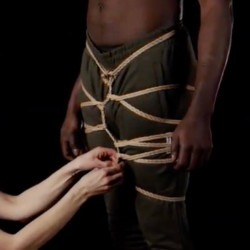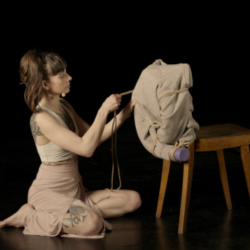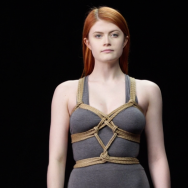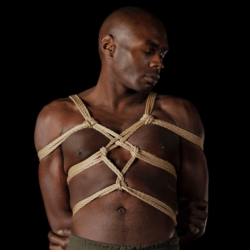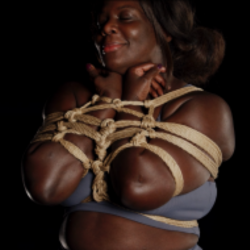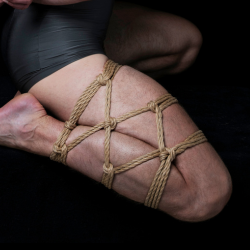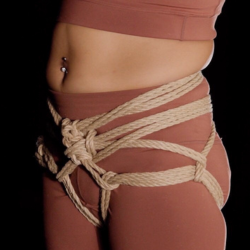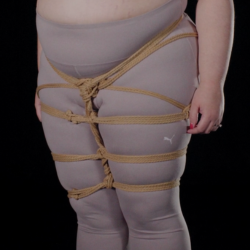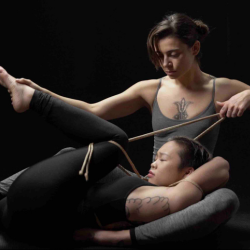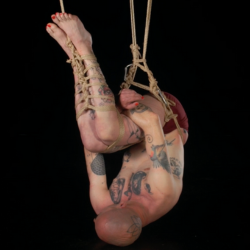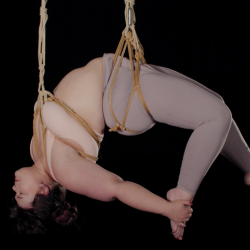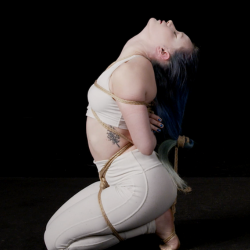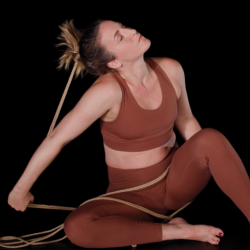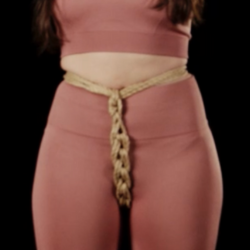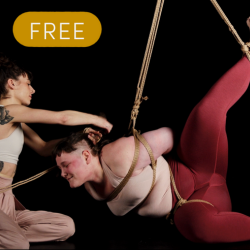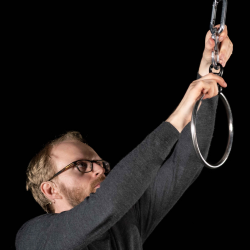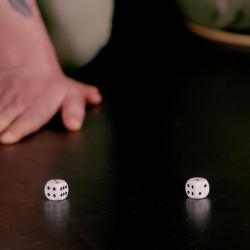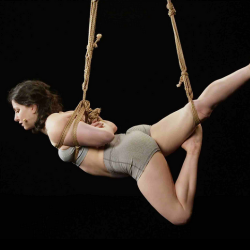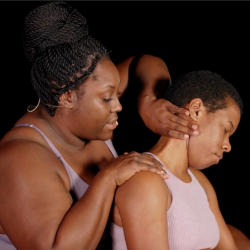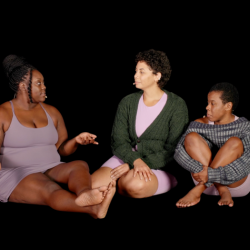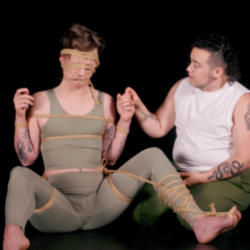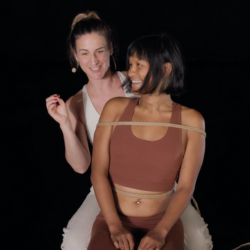EP 52
HITCHIN KITTEN
"Rope should be taught as a series of decisions rather than patterns," Hitchin Kitten suggests, emphasizing dynamic choices over rigid forms. In this episode, they discuss playful, movement-centered rope, grounding in intuition, and fostering inclusive, identity-based communities.

HitchinKitten (she/they/it) is a kitten-ish rope witch and sadomasochistic switch that likes her kink to be whimsically delicious. Her kink is connection, and rope is the path she takes to get there. Her approach to rope focuses on movement, foundational concepts, and functionality to encourage accessible, connective, and collaborative improvisation in rope practice and beyond. HK is also the facilitator of Hitchin’ Bitches PDX (Portland, Or, USA), and provides private and group rope instruction, as well as tastings at events.
[00:00:08] Wren Hello to all my guys, gals and non-binary pals. Welcome to the Shibari Study podcast. I'm your host, Wren. Shibari Study is an online learning resource offering video tutorials for beginners or advanced practitioners. Whether you're brand new to the world of shibari and needing to learn the basics, or a seasoned rigger or rope bottom seeking inspiration to push your practice to new places, there's something for you at shibaristudy.com. Today, I'm talking to Hitchin Kitten. HK uses they/she pronouns and is a kitten-ish rope witch and (…) switch that likes her (…) to be whimsically delicious. HK is also the facilitator of Hitchin (…) in Portland, Oregon. How's it going, HK? How are you?
[00:00:56] Hitchin Kitten It's going really well. Another rainy day here in the Pacific Northwest.
[00:01:01] Wren I'm actually in the Pacific Northwest too. Usually, I'm in LA, but I'm in Seattle right now and it's super rainy.
[00:01:07] Hitchin Kitten Yeah, we've had a lot of rain, but surprisingly a substantial amount of sunshine, which makes it tempting to go outside and do rope.
[00:01:15] Wren Yes. Do you like doing rope outside?
[00:01:18] Hitchin Kitten Yeah, I do. I just always... Am worried about public perception of that. But we've kind of normalized it a little bit here in Portland. We do a lot of outdoor rope jams. So I feel like the whole Keep Portland Weird mantra helps to continue to normalize the stuff we do in public.
[00:01:41] Wren Yeah, you're really taking it to heart. When you do an outdoor rope jam, are you bringing hard points or going to somewhere that has some sort of hard point?
[00:01:49] Hitchin Kitten Yeah, we commonly use some parks here and sometimes people will bring like tripods and stuff, but often will tie to trees or swing sets or slides. There's been some really interesting, like [00:02:03]hashiras, [0.0s] and really playful rope done at our local park.
[00:02:07] Wren I love that. How do you feel tying outside is different than tying inside? Is there a vibe change or an energy change?
[00:02:17] Hitchin Kitten For me personally, I think all of my rope is so playful. I don't feel a lot of shift. And because I also don't do a lot of, like, (…) stuff in my rope, there isn't necessarily a change in the way I do rope between public and private. I think maybe I might be more energized and excited if I'm outside in the sunshine. And I'm also a huge plant nerd. So anytime that I can pick up a gumball or shove my partner's face in the grass, I'm pretty stoked about it.
[00:02:50] Wren It's always interesting to me when people say they're not into (…) rope. Can you describe rope for you? Is it playful? It's joyful? Is it fun?
[00:03:02] Hitchin Kitten Yeah. I would say playful and joyful are words that I would use, but really, like connective is what I go for. I am someone who has been accused of just being a rough body player who uses rope, and I'm fine with that. I'm fine with that description. But really, like, I like... To be touching, grappling, manipulating. I incorporate a lot of things like Thai massage and stretching into the ways I practice both my partner and solo rope. So I'm very into the movement-based rather than the restrictive base.
[00:03:46] Wren How are you putting those elements into the scene? I feel like a lot of people start with a TK, they go up in the air for a bit, they come down. But if you're putting all these elements of grappling and stretching and Thai massage in, where are those actually falling in the scene?
[00:04:04] Hitchin Kitten Well, I for one thing, I really focus on groundwork and partials as a piece of my rope. And mainly this is because in suspension scenes, there's so much technical and safety elements that I have to be monitoring that I feel like I can't truly drop in and scene with my partner. I also – a lot of my rope is, is flow state based. So that's kind of how I negotiate my scenes is this idea of like, I know what I do in my rope flow states. So I negotiate based on those flow states so that I can drop into my body more and my instincts more.
[00:04:43] Wren Do you have any movement practices outside of rope?
[00:04:46] Hitchin Kitten Yeah, I do a number of different movement practices, and something I've been doing recently is kind of... Trying to synthesize and understand how my past history and movement practice is now incorporated into rope. I have a joke with one of my partners that, like, no intermediate rope exists because when we exist where we are at our particular rope stage, for me, what I remember are the initial, initial frustrations when I was learning rope, and then I don't remember a lot of the transition between initial frustration and experiences to now, which has now been almost six years. So...
[00:05:29] Wren It is so funny to hear about intermediate rope classes. There really isn't that. You're either learning things from the ground level, and I don't mean ground level and literally on the ground. I mean a base level of knowledge, knowing nothing. You're learning frictions and safety and things like that. I find the real part is learning the mental side and the safety side, knowing how to negotiate properly. Stuff like that.
[00:05:58] Hitchin Kitten I think that's really interesting because one of the approaches that I'm trying to take to rope now, like backtracking to the idea of like, I'm trying to figure out how my past movement practices have been influenced by rope, is trying to frame rope education around use what you know. We are all drawing from numerous lived experiences and knowledge bases, and all of those things can inform our rope practice. Right? So like I have a background academically as an ecologist and like analyzing the landscape as an ecologist is one of the key practices I use to understand my rope scenes. So that's kind of how I've been shifting the narratives of the way that I teach rope is like, we all have skills. How can we just apply them into our rope practice?
[00:06:51] Wren I am the furthest thing from an ecologist. I've killed every plant that I've ever owned. Not good at it. So when you say that there's an intersection between ecology and rope, can you elaborate on that?
[00:07:09] Hitchin Kitten So I guess I should probably start with, like what does an ecologist do, right? Ecosystems are these interconnections between our living and non-living world, and how they create communities between the non-living and the living world. Some people might describe these as like more than human communities. But when you're an ecologist, you're like basically a detective all of the time. You're looking for clues about what this particular thing, this plant, this animal, what is that particular plant or animal telling me about the landscape that I'm in? Is it telling me that this area burned ten years ago? Is it telling me that there's a lot of disturbance? Is it telling me that this area is really old and I can bring those same things into my rope practice when I break things down into functional components, because I think about,Oh, well, I see an X-friction here. What can I do next? Or what is this X-friction telling me about the next move in my tying. Right?
[00:08:16] Wren That makes a lot of sense. I never thought about it being a holistic approach. You being a detective makes perfect sense. I love what you just said about having an X-friction and being, being able to diagnose on a technical, kind of constructive level. Does that also influence how you're... Reading your partner? I'm trying to be clear that I think the word 'reading your partner' or that phrase is often used poorly, and I think it leads to gaslighting. I can read this person, I know what they're feeling, but there is a degree of feeling someone out and how they're responding. Does that play – does that also play into that?
[00:08:59] Hitchin Kitten Oh, definitely. And I have once again been trying to figure out how to articulate this because there is nonverbal communication involved. There's also like energetics, right? I do have some background in Reiki practice. I'm not a fluent Reiki practitioner, but I've learned a lot through Reiki and other systems of energetic healing. And again, some of those things have become quite intuitive in a way that it's difficult to articulate how and why I make the decisions I do when quote-unquote 'reading a partner'. But there are signs I look for, and I think I've seen some Shibari Study videos recently where the instructors were saying like, well, maybe you'll notice their facial expressions change. Maybe you'll notice their body relaxes or it tenses. Those are definitely cues that I look for when I am tying with people. Yeah, those are some of the key ones, but a lot of it feels very instinctual and often difficult to articulate.
[00:10:08] Wren That makes sense. Early on, you said it was easy for you to remember the initial hardships, but it was hard for you to remember the transition elements into getting into quote-unquote 'advanced knowledge. Can you share some of those initial hardships you had?
[00:10:28] Hitchin Kitten Yeah. So... I think one of the first things we encounter that I know I definitely encountered and continue to see other people encounter is people try to teach us patterns and then we're like, Okay, we can tie a pattern and now what do I do? And I guess it's also important to give context that my path into rope was also my path into (…). So it wasn't that I was a (…) who was already experienced and then started picking up rope. I was a new (…) and a new ropester, and those evolutions happened simultaneously. So like in my early practice, I was like, I don't know what to do now that I've put this chest harness on my friend, or things like, I'm tying a bigger bodied person, I only know how to do this one tie. I don't have enough rope for this person. And now we both feel crappy about it. Right? Because I just don't have the skills and abilities to make this engaging beyond just, Okay. I put some rope on you now.
[00:11:36] Wren That's really cool you said that. My intro to (…) was rope as well, and you really miss a lot of the play elements, at least for me. I became a rope purist in a lot of ways, and now it's just something to hide behind. Was just the idea that I didn't know how to do anything else. So I was hyper focused on the rope and things like that. How did you learn how to play?
[00:12:03] Hitchin Kitten Well, I think, I think I've always been very playful, and that was one of my frustrations in my early rope practice. And in the rope practice that I see is that it's really static. And as an ADHD person, I feel like I could go on for days about how my neurodivergent informs the way I practice rope, but, I couldn't stay still. I was bored by patterns and... I just, I wanted more movement and I didn't see a lot of movement-based rope. And I started to discover movement and innovation in my own self-tying practice. Because I was like, Okay, I tied a futo on myself. Well, I have ADHD and I want to roll around on the floor now, so I guess I'll go roll around on the floor with my futo. And that's where I started to discover a lot more dynamic experiences and also started bringing that into more of my partnered rope.
[00:13:08] Wren What is something you wish non-neurodivergent people knew about neurodivergent people in rope?
[00:13:17] Hitchin Kitten I mean I don't know if it's rope-specific or even neurodivergent-specific, but I think one of the most important things I found is like, can we be direct and find shared meaning? And I think that's valuable for both neurodivergent people and non-neurodivergent people. But I don't know. I use a lot of reflective or active listening processes in the ways that I negotiate for rope, and I feel like that helps us identify that shared meaning.
[00:13:52] Wren Can you explain reflective listening practices?
[00:13:56] Hitchin Kitten So there's a couple different types of listening, right? we can listen to specifically understand someone, to comprehend them. We can listen to respond, which probably in Western society is the major type of listening that we do because it's all about like, Oh, well, what are we going to say next? And there's listening to witness, right? Just to hold space for someone. And reflective listening is a component of this active listening, where we reflect back what we heard to confirm that we heard or understood what they were saying correctly.
[00:14:30] Wren Gotcha. And does that look like actually saying, I understand that, or is it repeating back what somebody says? Is it nodding with eye contact? What does that look like?
[00:14:42] Hitchin Kitten So typically it's repeating back what they said, but in language that you understand, right? So like oftentimes thinking about like education and like worksheets or like synthesize this, this article in your own words, right? That's basically what reflective listening is. And that's where we start to create that shared meaning, where like you may have said that... You use a certain set of words, right? And then I reflected back what I thought the meaning of those words were using words that... I would select, right? So it's not always an iteration of exactly what they said. It might be using a little bit different language. And then that person gets the chance to be like, Yes, I find shared meaning in what you said. That is what I said. Sounds like we're on the same page.
[00:15:34] Wren Did you have that skill before entering rope, or was that something you gained in rope?
[00:15:42] Hitchin Kitten I would say that it's something I kind of just picked up from evolving in the poly communities, in addition to being a new (…) and a new ropester simultaneously. I was also a new– newly defined polyamorous person. I can look back on my life and definitely see all of the ways polyamory existed in my life, but I never had the language for describing it. So I, the reason I moved to the Pacific Northwest is because I wanted new and different ideas. I came from the Gulf South, where I didn't get exposed to a lot of this language. There was a very different political agenda. And I just learned so much just in the communities I connected with when I moved here to Portland.
[00:16:32] Wren I grew up in the South as well.
[00:16:35] Hitchin Kitten I'm sure we can commiserate for a long time about it.
[00:16:39] Wren Can you talk to me about Hitchin (…)?
[00:16:42] Hitchin Kitten Yeah. So Portland's chapter of Hitchin (…) has been around for about 11 years now, and I'm super excited because one of our volunteers just started to put together an oral history of our organization. But Hitchin (…) International is a broader global organization that was started by Hedwig. And I think we were one of the earliest chapters, but apparently are currently one of the most active chapters, which I feel very privileged by, especially recently with the number of volunteers we have supporting. Hitchin (…), in its broadest definition, is a rope group that centers the experiences of women and gender-expansive people. Some Hitchin (…) chapters are more focused on women that could be cis women, trans women, trans femme people. But our chapter kind of basically broadens it to self-identified women and gender-expansive people. To clarify that, we put an FAQ up on our websites that are basically like, Can trans men and trans masc people tie here? We say, yes. Right? Can cis men tie here? No, however, you can come as a bottom with someone else who is under the women and gender-expansive umbrella. It's been a really fun journey and there's just been a lot of learning, because the language around gender... Has and will continue to evolve, especially as many of us become more connected with our ancestral understandings of gender. But we've worked really hard to build a space that is not just what many people would call like, Oh, it's women and women light. Right? It's a space that represents people that are not only self-identified women, but also representative and include the voices of a variety of gender expansive people.
[00:18:55] Wren When most dungeons and play spaces are cis het men focused and cater towards that group, there needs to be other places for marginalized people to go and feel comfortable and be able to express themselves and do things. I like what you said about 'it's not women and women light' because a lot of the times it feels like people are saying normal women and everyone else can come too.
[00:19:25] Hitchin Kitten That's what we strive for. And we, we do a lot of feedback and iterations, especially of our About section. We're like, Hey, this is the about section we have, what feels wonky about it? And what language feels better? You mentioned marginalized people. One of the pieces that we incorporated relatively recently was the idea of marginalized genders. And while I'm not super, I don't know how long I want to center marginalization, right? As a key piece of describing a set of genders, I do think it is very useful and kind of describing the intent of the group, right? This is a space that aren't cis men to tie and be tied with out so much pressure of the cis male gaze.
[00:20:19] Wren Can you talk about your approach to teaching some?
[00:20:24] Hitchin Kitten Yeah, I think I kind of alluded to this earlier, but a lot of my teaching is, is trying to help people build confidence and draw from the skills they know. Because what I observe, and what I remember experiencing is early on– and many people years into their rope pathway are just experiencing frustration about quote unquote not getting it right. Well, I didn't get it right. And what I try to do is deconstruct... Is it about getting the pattern right or getting the knot right? Or is it about an emotion, a feeling, a connection with yourself or your partner? And if you are achieving that emotion, feeling or connection, then in my opinion, it's successful. I was just at a class my friend was teaching, and it was actually on like connective caressing style rope, and they were talking about like how to move the rope across your partner's body. And I was coaching this pair and they were like, Oh, that's not that's not how they did it. You're not doing it the same way. I was like, Pause. As– you as a top, do you have both hands on the rope and are you feeling connected? And they were like, Yes. And I looked at the bottom and I went, Okay, are you feeling connected? And the movement passing over your skin? And they said, Yes. I was like, Okay, then you have achieved the goal.
[00:21:51] Wren Good job everybody. You've done it.
[00:21:54] Hitchin Kitten You did not have to do it exactly like the instructor. You had to do it in a way that checked your connection boxes, which was the goal.
[00:22:02] Wren I was talking to Loom recently on this podcast, and he was talking about teaching, and I asked, what's something that you see students or people taking your class neglect or forget about? And he said, The bottom. I was like, You're right. I didn't even think about that. It's true. It's true.
[00:22:24] Hitchin Kitten I guess that also relates to the ways that I teach is because I teach rope as ongoing collaboration. And the fact that, like, the bottom is giving feedback and engaging constantly and being receptive to that feedback and engagement is an important part of manifesting our rope relationships.
[00:22:50] Wren It feels like a lot of what you're saying is you don't subscribe to the idea of sequences, or there being an end point of a scene or something like that.
[00:23:05] Hitchin Kitten I would say there are definitely end points of scenes, but maybe not end goals. Beyond like, this is what I– what I want to connect with. So for example, I typically center all of my negotiation on like, what do you want to feel? And actually, the majority of my rope practice at this point in time is tastings. So there actually really are like end– there's an end endpoint to the tasting and there's an end goal. They tell me what they want to experience, and I do my best to create that outcome. And at the end of my tasting, I'm like, Did we feel like we check those boxes? And usually they say yes.
[00:23:55] Wren How many different things are you doing in a tasting?
[00:24:00] Hitchin Kitten So my tastings are dynamic rope-based. They're usually 10 to 15 minutes. They usually require no more than 2 to 3 ropes. And I center on body manipulation. Whether that's a person that is in a chair. I really love body manipulation in chairs or on the ground. So. My whole focus in those tastings is, I want you to feel the experience of rope on your skin, but I also want you to hopefully experience something more than just the rope on your skin, right? And that means a lot of torsioning of the body, moving them, having control over their body. So there is a lot that happens in that 10 to 15 minutes. And it's frequently centered on body manipulation. Sometimes if people say, I just want to feel pretty, can you tie a pretty chest harness on me? I'm like, Yes, totally, I will tie that pretty chest harness on you, what do you want me to accentuate?
[00:25:04] Wren Was there anything you did specifically to learn about ways the body moves? How to move things? Because for me, one of the best things a rope top can do is grab my body and move it intentionally. My favorite rope tops do that and they do it well. How do you learn that?
[00:25:24] Hitchin Kitten There is a lack of body manipulation education. And it's interesting because I've met some friends who come from martial arts backgrounds. And I think I probably pull a lot of my body manipulation from Thai massage and, just like, general like... Exercise science and, like, stretching. But it's interesting pulling from circus and pole and capoeira, and Thai massage. And then my martial arts friends doing very similar things. I recently have done a really fun collaboration with my friend, Excess Knots, where they've kind of taken the frameworks and language for martial arts body manipulation, and they've laid it on top of the ways that we both move bodies to have kind of a framework of understanding.
[00:26:23] Wren I love it.
[00:26:23] Hitchin Kitten But yeah, it's just, it's so curious. The more people you're exposed to and like, the more people you learn from, you see overlapping, overlapping skills and experiences with different language to describe that, right?
[00:26:40] Wren Absolutely. Have you taught a body manipulation class?
[00:26:45] Hitchin Kitten Yeah, I've been teaching it with Excess Knots recently actually. I always incorporate some form of body manipulation into all my classes. And... Typically, the piece that I teach people is how to bring someone from seated to laying down on their side. Because I feel like a lot of times it gets pretty intuitive once you get someone on their side. But how do you do it smoothly? So I do definitely teach some basic body manipulation in all of my classes, but the body manipulation class itself really centers how you can do an entire scene of body manipulation with or without rope, and it can still be equally as connective or sensual or whatever descriptor you're using. But yeah, body manipulation is one of my favorite, favorite things.
[00:27:42] Wren Do you see a common thread in people that are struggling to get body manipulation down?
[00:27:50] Hitchin Kitten You know, it's interesting because I feel like when people come to my classes to learn body manipulation, I don't necessarily see them struggle with it. I think with just a little bit of guidance and a little bit of decision-making process, which in my opinion, what rope should be. [00:28:09]It should be taught as a series of decision, decisions rather than patterns. [3.8s] People typically really roll with it and again, they can draw from their experiences. So when I taught my last body manipulation class, I did a lot of reflection on like, Well, how do I know how to move bodies? I was like, Well, I've been working with and restraining small and large animals for over a decade, right? So like, I think that actually does play a role in my ability to understand and know how to manipulate bodies. I would have never thought that, but subconsciously it has influenced it.
[00:28:49] Wren That makes a lot of sense. You said that rope should be taught as a series of decisions. What are those big decision points that that need to be made? Where do they fall? If there were 3 or 4 of them, where would they fall in a scene?
[00:29:06] Hitchin Kitten I mean, I think the first decision you make is like, what do I want to experience? Both the top and the bottom. And then the decisions following that are just series of decisions about how do I make that happen? Right? So often times if someone wants restriction, I'm like, Oh, the series of decisions I need to make around restriction are like, I'm going to take away limbs, I'm going to tie futomomos, I'm going to bind their arms, I'm going to put my body on top of theirs and be dominating. Right? So it's it's less of individualized decisions and more like I have a palette of choices. Which one am I going to color in here?
[00:29:52] Wren Love it. What do you want to do today as an artist? Do you think about rope as art?
[00:30:00] Hitchin Kitten Oh, for sure. Definitely. I think any form of movement is, is art, right? I really love body expression and body movement. And it's funny because people will ask me to perform, right? Which is a type of art. And I'm like, Listen, I'm like. I'm not really a quote unquote performer, but I hear people like to watch me tie. So I will do a scene for you and you can call it a performance, but I'm not going to call it a performance.
[00:30:34] Wren Kind of logistical question. It sounds like you do a lot of stuff on the ground. Do you still do that in performance? Because I feel like a lot of the times you have to be up so people can actually see what you're doing. Do you modify anything for performance?
[00:30:52] Hitchin Kitten Well, I rarely do performance, but the the space I most commonly do that in at the Seattle (…) Arts Festival on the bondage stage. And that stage is risen up. I do do partial suspensions for that. So I like lift the top of my bottom up. But because the stage is raised in this case, and at most of the venues where I would consider doing it have raised stages.
[00:31:22] Wren And all those people know what you're doing. They understand it. They're in the community, they're in the scene. They get what you're going for. It's not a bunch of random people at... A (…) nightclub for a (…) party.
[00:31:38] Hitchin Kitten Yeah, yeah. It's true. It's a little bit of a different demographic.
[00:31:42] Wren Would you like to talk about negotiation type of stuff?
[00:31:46] Hitchin Kitten I definitely have thoughts on negotiation. And I think the central point that I keep returning to is that we need to work from an abundance mindset in our negotiations, rather than a scarcity mindset. Because often times we might make, we might say a yes that is influenced by the idea that if I don't say yes, I won't get this opportunity. If I don't say yes, I may not be able to find another top or another bottom to tie with, right? And I think it's the scarcity mindset, which sometimes makes us say yes to things that we're less than excited about. The things that we're not 120% about. That isn't to say a yes-questionmark isn't workable within the ways that I negotiate scenes. Because I have a couple partners I play with where... We don't always have full access to how we're feeling. We don't always know exactly what we want, but we can trust that in each other we can say yes, and if we want to change in the moment, we can then say no.
[00:32:55] Wren Yeah, if you start in insecurity, you're never going to be in a place that you're happy with after your negotiation. That's such an interesting point. Yeah, if you start in scarcity, you're never going to be able to really do what you want to do. You're feeding an ego or something like that.
[00:33:16] Hitchin Kitten Yeah, I think the scarcity mindset is a really big one. Which leads up to a myriad of issues in the rope community, right? And it also continues to decenter the need for... Actually building relationships, right? As a, as a femme presenting top, and I know many rope tops, they get burnt out because they feel like people just want them to be– like, just want to be tied up. And you're just a (…) dispencer. Right? And when we operate from scarcity, we are also not giving time and energy and commitment to building true relationships with people beyond, I'm only staying in this relationship, whatever that is, because you'll tie me. Right?
[00:34:07] Wren Yeah. Yeah, in actuality, it takes time. You don't have to do everything on the first meeting. You don't have to do everything in the first couple meetings. You should save something for later. There will be a second date. And if that person doesn't want to see you again, or if you don't want to see a top again or [00:34:28]bottom [0.0s] or whatever, that's fine. There's so many people out there that do this.
[00:34:34] Hitchin Kitten Yeah. I guess they're– I think one of the reasons people feel isolated is because they're not as well connected, right? I remember– and even now there's like just the different channels of social media. There will be something pop up, I'm like, Someone's doing rope dance in Portland. I'm, I love doing rope dance. And how can I be a rope dance human in Portland and have no idea that this rope dance event is going on? Right? I feel like even when we're well-connected in community, there's still a lot of missing notices. And when people are first entering the rope community or the (…) community or the polyamorous community, they don't, they don't see and aren't connected to the resources yet. And that's why they feel like they're sitting in scarcity.
[00:35:23] Wren My last question, and this might be an impossible question. I almost feel bad for asking it, but I'm gonna ask it anyway. When you think about the word community and resources, what do you think the best ways to connect people to resources is, and have an actual community that can help people and grow people?
[00:35:47] Hitchin Kitten Well, this is actually a really good question, and I think I do have an answer for it. And I'm going to use Hitchin (…) PDX as my answer. So one of the things that we are centering in the Hitchin (…) PDX is access and representation. And we're addressing that through a lot of different means. Financially, having no one turned away from lack of funds. Another way we address the financial resources in rope education is by providing books for pay what you can prices. So we'll use our funds as an organization, for example, to buy copies of Shay's Tying and Flying. I'm hoping to get Fuoco's Put Me in a Box. Evie Vane's collection of Better Bondage for Everybody. We purchased these resources from their publishers or from the educators directly, and then we sell them at pay what you can through Hitchin (…), even if that means it's $0. We have goals to also provide pay what you can rope kits and things like that. So like we address financial barriers. We also address social barriers such as people who don't want to get on FL or aren't interested in FL, to reach people who aren't on FL, we created a MailChimp. Is that MailChimp more effective at reaching people? I don't know, I feel like we get sent to spam a lot, but we have over 230 people on that mailing list, and we've only had it for... Maybe a year? So the social aspects – also touching back to like the gender identity or the identity-based group that Hitchin (…) is we've strived really hard to carve out intentional spaces for it being not just a women's group, right? So working really hard on our language and getting community feedback. Also in regards to feedback, Covid policies. We've gotten continual community feedback on what, what policies make you willing to attend Hitchin (…)? So I address some financial ones and some social ones. And things like Discord, surprisingly, have been really – I say surprisingly, because I don't like social media very much. And I, I tend to just wallflower in social media, but with the way people are engaging in our Hitchin (…) Discord, I actually feel the desire to engage, which is novel for me as an internet wallflower. But I guess those are two key framings for how at least Hitchin (…) PDX is addressing this.
[00:38:48] Wren That makes a lot of sense. I appreciate you sharing that stuff. That's huge. It sounds like you're adding actual people into the word community. And I believe that the word community, when it's often used in regards to (…) is devoid of people. It's generally just used to describe a bunch of humans that enjoy doing the thing to each other, but it's not taking into account the socio-economical needs, the different things like that. And you talking about that is very cool.
[00:39:22] Hitchin Kitten Yeah, well, I think even I've been shifting towards using the language communities plural. Right? Because there are multiple communities that Hitchin (…) PDX serves, and Hitchin (…) PDX as a community player should be invested in the continual development of identity-based rope groups and things like that. So like maybe a trans-specific rope group. Hitchen (…) could help get that up and running. A BIPOC-specific rope group. Hitchin (…) could provide support to get that up and running. So I think the plurality of communities is an important thing to center when we talk about these things.
[00:40:00] Wren I want to thank you so much for being on. Where can people find you if they want to get involved with Hitchin (…) or they want to connect with you?
[00:40:07] Hitchin Kitten Yeah. So we do have a website for Hitchin (…) PDX. Pretty sure if you just search Hitchin (…) PDX, our MailChimp website will pop up. There's not much content on there now. But you can sign up for our email list there. You can also find Hitchin (…) on FL. PDX on FL. For me personally, I do have a personal FL page and a personal Instagram page. Both of, both of them are, like, more private and centered on folks who are my friends. So if you just want to see what I'm up to, please give me a follow. But you're also welcome to message me and introduce yourself on either of those platforms if you wish.
[00:40:48] Wren Thank you so much for being on. Thank you for sharing all of your knowledge and your wisdom with us.
[00:40:55] Hitchin Kitten Thanks, Wren, I really appreciate being here.


